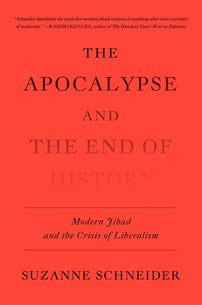The Apocalypse and the End of History: a Letter from the Editor
"In her incisive and accessible study of Islamic jihad, Suzy shows how jihad is the ur-form of contemporary politics, no departure from western capitalism but rather an acceleration and crystallization of it."

Suzy sent me her book proposal for The Apocalypse and the End of History the month before New York City went into Covid-19 lockdown. She and I worked toward the first draft during those initial months in spring 2020, when it became clear that we were witnessing a massive failure: in health care, in infrastructure, in the relationship between the self and the common good. In the summer, cities exploded in protest of racist police violence, and the entire west coast of the US burned, too dry and hot from climate change. In November, it seemed the endurance of democracy in the country I lived in hinged on very little, and it became commonplace to say so.
Suzy’s manuscript was my guide to that year, the best book I know of for explaining our contemporary world, rife as it is with privatized and spectacular violence, authoritarian populism, and crumbling faith in a collective future. In her incisive and accessible study of Islamic jihad, Suzy shows how jihad is the ur-form of contemporary politics, no departure from western capitalism but rather an acceleration and crystallization of it. That is, the apocalyptic vision of Islamic jihad is akin to the exhaustion of a western liberalism said to signify “the end of history,” the best humanity can hope for. What bad choices—no wonder we are all exhausted and despairing!
Publishing on the twentieth anniversary of 9/11 as the Taliban are posed to reconquer Afghanistan, The Apocalypse and the End of History stands in judgment of the bombast of the United States in those years. Here is what the bombs raining on Kabul and Baghdad have brought us: not a “clash of civilizations” or the triumph of the west, as the neo-colonial war boosters liked to put it at the time, but a world of violent desperation, played out in variations across the globe. If 9/11 was a tragedy, these wars multiplied that tragedy thousand-fold around the globe.
But we have more than tragedy, Suzy writes. If “the apocalypse and the end of history” are “two distinct symptoms of the collective inability to envision ... something better here on earth”—well then. This book is the indispensable guide to finding our bearings and beginning to envision something better. Suzy’s book is a study of violence written for the best of reasons: to prompt us to imagine otherwise.
– Jessie Kindig, editor
[book-strip index="1" style="buy"]